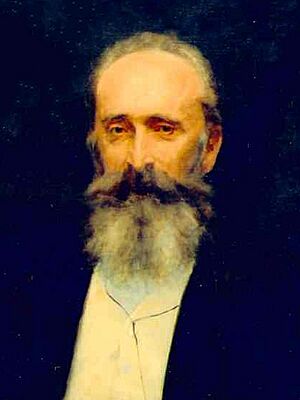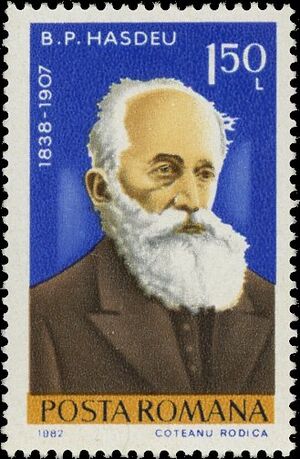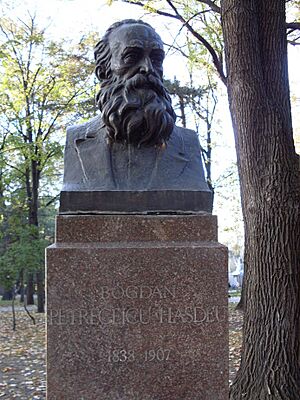Bogdan Petriceicu Hasdeu facts for kids
Quick facts for kids
Bogdan Petriceicu Hasdeu
|
|
|---|---|

Hasdeu by George Demetrescu Mirea (1887)
|
|
| Born |
Tadeu Hâjdeu
February 26, 1838 |
| Died | September 7, 1907 (aged 69) Câmpina, Kingdom of Romania
|
| Resting place | Bellu Cemetery, Bucharest |
| Alma mater | University of Kharkiv |
| Children | Iulia Hasdeu |
| Parent(s) |
|
| Scientific career | |
| Fields | Philology |
| Institutions | National Archives of Romania University of Bucharest |
Bogdan Petriceicu Hasdeu (born Tadeu Hâjdeu on February 26, 1838 – died September 7, 1907) was a famous Romanian writer and philologist. A philologist is someone who studies languages and old texts. Hasdeu was a pioneer, meaning he was one of the first to explore many areas of Romanian language study and history.
Contents
Life Story
Bogdan Petriceicu Hasdeu was born in a place called Cristineștii Hotinului. This area was then part of Imperial Russia. His father, Alexandru Hâjdeu, was also a writer. Their family, the Hâjdău, were Moldovan boyars. Boyars were important noble families in Eastern Europe.
Hasdeu studied law at the National University of Kharkiv. After his studies, he joined the Russian army as a hussar, a type of soldier. He even fought in the Crimean War. In 1858, he moved to Iași, a city in Romania. There, he worked as a high school teacher and a librarian.
In 1865, Hasdeu wrote a book about a historical ruler named Ioan Vodă cel Cumplit. Hasdeu called him "Ioan Vodă the Brave." This book described Ioan's short but strong rule as a great time for Romania. Some critics did not agree with his view.
In 1863, Hasdeu moved again, this time to Bucharest. He started a funny magazine called Aghiuță. It stopped being published the next year.
His Scientific Work
In Romania, Hasdeu began working on Arhiva historică a României (1865–1867). This was one of the first history books to use old texts in both Slavonic and Romanian. He also created a language review called Columna lui Traian in 1870. It was considered the best of its kind in Romania at the time.
With his work Cuvente dân Batrâni (1878–1881), he was the first to study the history of "apocryphal literature" in Romania. Apocryphal texts are old writings that are not officially accepted or are of unknown origin.
His book Istoria critică a Românilor (1875) was not finished. However, it marked the start of a careful study of Romanian history. Hasdeu also edited an old book of psalms from 1577, called Psaltirea lui Coresi (1881).
One of his biggest projects was Etymologicum magnum Romaniae (1886). This was meant to be a huge dictionary of the Romanian language. He only finished parts of it, covering words starting with 'A' and 'B'. This dictionary was very detailed. However, some of his ideas in it were more imaginative than based on facts. For example, he claimed to trace the ancestry of a ruler named Basarab I directly back to ancient Dacia.
Hasdeu also took part in a debate about where the Romanian language came from. Many people argued that Romanian had many words from Slavic languages. Hasdeu came up with an idea called "the theory of words' circulation." He believed that even though there were Slavic words, Latin words were used more often. This usage, he argued, gave the Romanian language its main character.
In 1876, he became the head of the State Archives in Bucharest. In 1878, he became a professor of philology at the University of Bucharest. He was also chosen as a member of the Romanian Academy in 1877. In 1883, he became a foreign member of the Russian Academy of Sciences.
Other Activities
Hasdeu was also involved in politics. He was a member of the Liberal Party. He was elected to the Romanian Parliament twice. He faced some political challenges during his life, but he was always cleared of any wrongdoing.
Later Life and Death
A very sad event happened in Hasdeu's life: his only child, his daughter Iulia Hasdeu, died in 1888. After this, he became very interested in spiritism. Spiritism is a belief system that involves communicating with spirits. He moved to a mansion in Câmpina and turned it into a special place dedicated to his new beliefs and his daughter. He died there in 1907 and was buried in Bellu Cemetery in Bucharest.
Hasdeu wrote two plays: Răsvan și Vidra and Domnița Ruxandra. Between 1891 and 1892, he wrote Sic Cogito. This was a book about spiritism as a philosophy. Besides his scientific work, Hasdeu also wrote many poems. A famous Romanian critic, Mircea Eliade, called him a "genius of an amazing vastness."
About His Name
The name Hasdeu is pronounced with a sound like "sh" (Hașdeu). However, Hasdeu himself never wrote it with a special mark (diacritic). This was likely because the Romanian alphabet changed a lot during his lifetime.
Many people think Petriceicu is his first last name. But it is actually his middle name. He chose this name himself. It showed his family's belief that they were related to a 17th-century Moldavian ruler named Ștefan Petriceicu.
See also
- Protochronism
 | Claudette Colvin |
 | Myrlie Evers-Williams |
 | Alberta Odell Jones |



